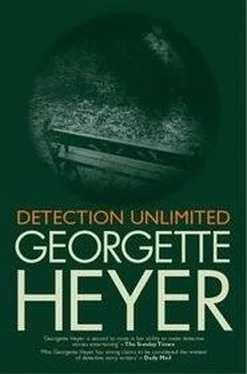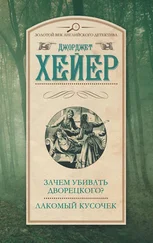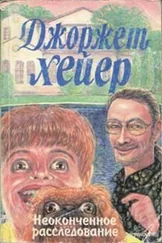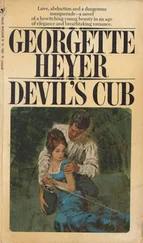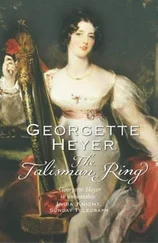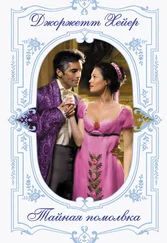Джорджетт Хейер - Detection Unlimited
Здесь есть возможность читать онлайн «Джорджетт Хейер - Detection Unlimited» весь текст электронной книги совершенно бесплатно (целиком полную версию без сокращений). В некоторых случаях можно слушать аудио, скачать через торрент в формате fb2 и присутствует краткое содержание. Год выпуска: 1953, Жанр: Детектив, на английском языке. Описание произведения, (предисловие) а так же отзывы посетителей доступны на портале библиотеки ЛибКат.
- Название:Detection Unlimited
- Автор:
- Жанр:
- Год:1953
- ISBN:нет данных
- Рейтинг книги:4 / 5. Голосов: 1
-
Избранное:Добавить в избранное
- Отзывы:
-
Ваша оценка:
- 80
- 1
- 2
- 3
- 4
- 5
Detection Unlimited: краткое содержание, описание и аннотация
Предлагаем к чтению аннотацию, описание, краткое содержание или предисловие (зависит от того, что написал сам автор книги «Detection Unlimited»). Если вы не нашли необходимую информацию о книге — напишите в комментариях, мы постараемся отыскать её.
Detection Unlimited — читать онлайн бесплатно полную книгу (весь текст) целиком
Ниже представлен текст книги, разбитый по страницам. Система сохранения места последней прочитанной страницы, позволяет с удобством читать онлайн бесплатно книгу «Detection Unlimited», без необходимости каждый раз заново искать на чём Вы остановились. Поставьте закладку, и сможете в любой момент перейти на страницу, на которой закончили чтение.
Интервал:
Закладка:
By this time, the younger Peke, encouraged by the example set her by her grandfather, was effusively making the Chief Inspector welcome. Sergeant Carsethorn heaved an exasperated sigh, but no one could have supposed from Hemingway's demeanour that he had come to Thornden with any other purpose in mind than to admire Mrs. Midgeholme's Pekes. Within a few minutes he and Mrs. Midgeholme were fast friends; and he could have answered an examination-paper on Ulysses's superlatively good points, the number of prizes he had won, and the number of prize-winners he had sired. It was on a wave of good-will that he was finally ushered into the drawing-room. Here, seated in a wing-chair, with her hands folded in her lap, was Mavis Warrenby. Not being one of those who considered no wardrobe complete that did not contain at least one Good Black Frock, she had been unable to array herself in mourning, but had compromised by putting on a very unbecoming dress of slate grey. She got up, as the party entered, and said, casting a somewhat spaniel-like glance at Mrs. Midgeholme: “Oh, what—?”
“Now, there's nothing to be nervous about, my dear!” said that lady bracingly. “These are two detectives from Scotland Yard, but you've no need to be alarmed! They're very nice, and I shall remain with you all the time!”
“Oh, thank you! I'm sorry to be so silly,” Mavis said, with a fleeting look at Hemingway. “I think it must all have been a little too much for me. Of course, I know I must be prepared to answer questions, and I shall do my best to help you in any way I can. I know it's my duty to, however painful it may be.”
She then proceeded, with very little encouragement, to relate the whole story of her activities on the previous afternoon, not omitting a description of her qualms at leaving the late Mr. Warrenby alone in the house, and what she had said to Mrs. Haswell on perceiving how late it was. Not unnaturally, since she had by now told her story a good many times, it had grown a little in its details, and she had talked herself into almost believing that she had had a premonition of evil when she had left the house. But in two essentials the tale was identical with the version Sergeant Carsethorn had already heard: she knew of no one who could have had any reason to kill her uncle; and she had seen no one at the time when she had been startled by the shot.
“Do you know,” she said simply, “I can't help feeling glad I didn't see anyone? It would be such a terrible thing to know I mean, it can't bring Uncle back, and I'd much, much rather not know!”
“We know just how you feel, dear,” Mrs. Midgeholme assured her. “But you wouldn't want your uncle's murderer to go unpunished! Besides, we can't have a killer allowed to wander about our dear little village. We should none of us be able to sleep in our beds. I don't believe in trying to conceal things. I was just talking it over with Miss Warrenby when you arrived, Inspector, trying to think who might have done it.”
“I don't think one ought to,” said Mavis, in a troubled tone.
“Well, if you'll pardon me,” said Hemingway, “that's where you're wrong! If you do know of anyone who might have done it, it's your plain duty to talk about it to me!”
“Oh, but I don't! I can't imagine!”
“Really, Mavis, that's going too far!” protested Mrs. Midgeholme. “It's all very well to be loyal to your uncle's memory—not that you've any reason to be!—but when you tell the Inspector that your uncle had no enemies—well, it just isn't true, dear, because you know very well that he had! I don't say it was his fault—though of course it was—but facts are facts! Heaven knows I'm not one to gossip about my neighbours, but I should very much like to know what Kenelm Lindale was doing after he left that party. I've always said there was something fishy about the Lindales. The way they live, never going anywhere, or taking a real part in Thornden society. It's all very well for Mrs. Lindale to say she can't leave the baby, but I think she's just standoffish. Why, when they first came to Rushyford Farm I went to call immediately, and did my best to be a friend to her, but she was quite unresponsive: in fact, she made it very clear that she'd rather I didn't drop in at the Farm without being invited.”
“I'm sure she's always been very nice to me,” said Mavis repressively.
“Oh, I'm not saying she isn't perfectly polite, but do you get anywhere with her?” demanded Mrs. Midgeholme. “When I asked her about her people, and where she came from, and how long she'd been married, she was evasive. There's no other word for it: evasive! I wondered at the time if she had anything to hide. Well, it isn't natural for a girl—for that's what she is to me!—not to talk about her people! And I'll tell you another thing,” she added, rounding on Hemingway, “they never have anybody to stay! You'd think her mother and father would visit her, or his mother and father, or a sister, or something, wouldn't you? Well, they don't! Not once!”
“Perhaps they're dead,” suggested Hemingway.
“They couldn't all be dead!” said Mrs. Midgeholme. “Everybody has some relations!”
“Oh, Mrs. Midgeholme, please don't talk like that!” begged Mavis. “Now Poor Uncle has passed over I haven't any relations either. Not ones I know!”
“But you're not married, dear,” said Mrs. Midgeholme, somewhat obscurely, but with an air of one who had clinched the matter.
At this point, the Chief Inspector intervened. He said that he would like to go through the late Mr. Warrenby's papers, and in Miss Warrenby's presence.
“Must I?” Mavis asked, shrinking from the prospect. “I'm sure Uncle wouldn't have liked me to pry into his desk!”
“Well, it's not to be supposed he'd have liked any of us to do so,” said Hemingway practically. “However, that can't be helped, and as I understand you're an executor to his Will, I think you'd better come and keep an eye on me.”
A biddable girl, she rose to her feet, saying as she did so: “I couldn't believe it, when Colonel Scales told me that! I never had the least idea Uncle meant to appoint me. I'm afraid I don't know what executors do, but I'm so touched it makes me want to cry!”
She then led the way across the hall to the large, sunny room on the other side of it, which Mr. Warrenby had appropriated as his study. She paused on the threshold, and smiled wanly upon Hemingway. “I expect you'll think me very foolish, but I hate going into this room! Of course, I know he wasn't—I know it didn't happen there, but still I can't help looking for him when I go in. And I want to get rid of that seat in the garden at once. That is, if the police don't mind? I know nothing must be touched until you say so.”
“No, I don't mind: very natural you should want to get rid of it,” said Hemingway, stepping into the study, and looking round.
“Every time I see it it reminds me!” said Mavis, shuddering. “My uncle very rarely sat out of doors. It was really my favourite seat, which seems to make it worse somehow. Doesn't it seem dreadful to think that if it hadn't been so terribly hot I don't suppose he ever would have taken his work out into the garden, and then none of this would have happened?”
The Chief Inspector, who was growing tired of these gentle inanities, agreed to this, and nodded to the constable who had been sitting in the room, reading a newspaper.
“I thought it best to leave a man on duty till you came, sir,” explained Sergeant Carsethorn. “We couldn't very well seal the room, on account of the telephone. It's the only one in the house.”
A slight twinkle was in the Chief Inspector's eye as his gaze alighted on the instrument, which stood on Sampson Warrenby's desk. It appeared to him that Miss Warrenby must have been obliged to enter the study a good many times since the murder of her uncle. As though she read his thought, Mavis said: “I've come to dread the sound of the telephone-bell.”
Читать дальшеИнтервал:
Закладка:
Похожие книги на «Detection Unlimited»
Представляем Вашему вниманию похожие книги на «Detection Unlimited» списком для выбора. Мы отобрали схожую по названию и смыслу литературу в надежде предоставить читателям больше вариантов отыскать новые, интересные, ещё непрочитанные произведения.
Обсуждение, отзывы о книге «Detection Unlimited» и просто собственные мнения читателей. Оставьте ваши комментарии, напишите, что Вы думаете о произведении, его смысле или главных героях. Укажите что конкретно понравилось, а что нет, и почему Вы так считаете.
